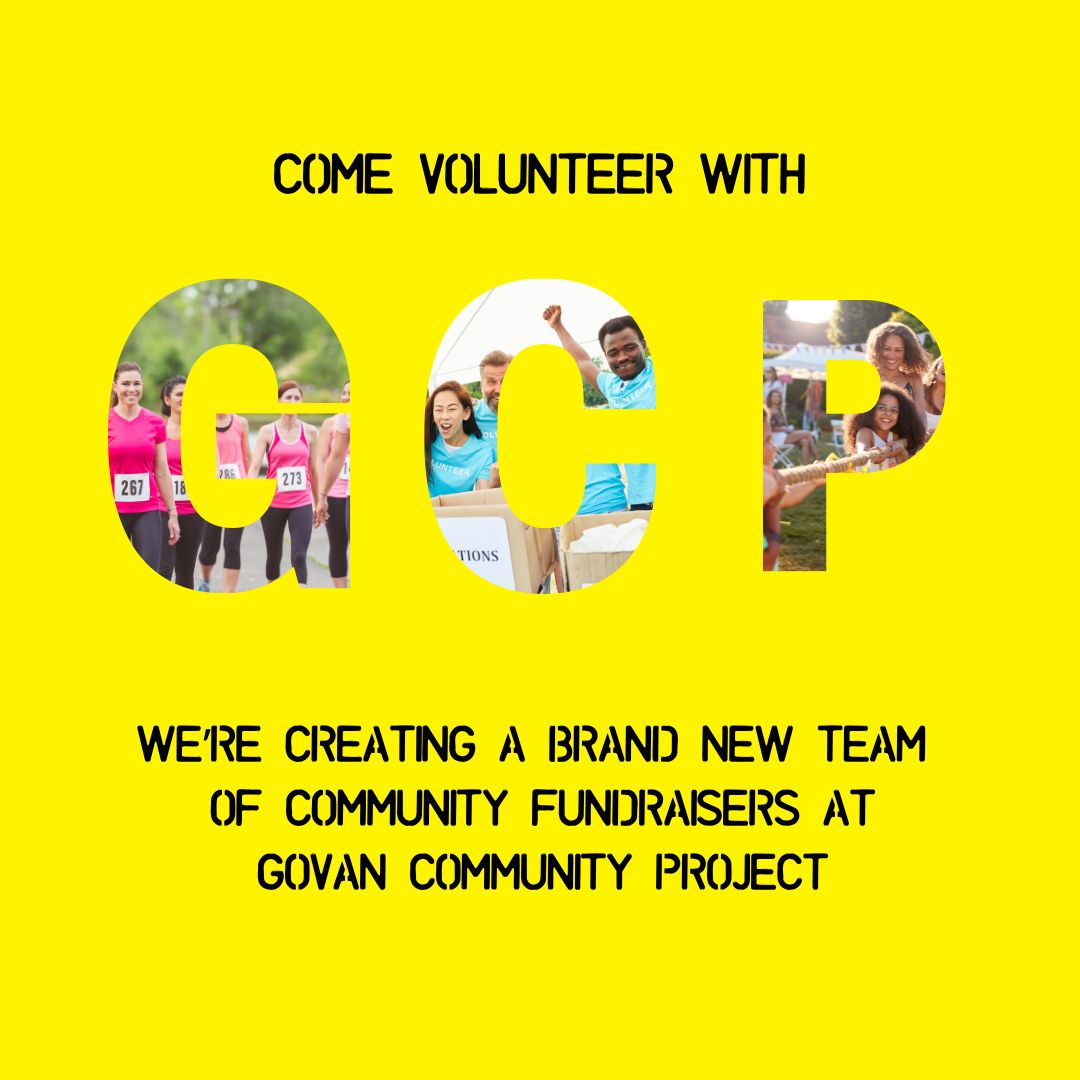Author: Chloe Smith
Traci Kirkland, Head of Charity at GCP, outlined her message to the new government in our latest newsletter, read below.
“This month we have seen a new UK Government, whose slogan was ‘change’. Here at GCP we really hope that change includes a realistic and compassionate reform to immigration policies, moving away from the hostile environment towards building an inclusive society where everyone’s contributions are recognised, valued and welcomed.
We stand alongside partner agencies we work with in the migration sector and all of our community members to make an appeal to the Prime Minister and his new government to make rebuilding the immigration system one of their big changes. To this end we continue to be part of the Fair Begins Here campaign from Together for Refugees. Polls increasingly show that the majority of the nation see migration and diversity as a huge benefit to our communities and our economy. They agree that the current, dehumanising system is broken beyond repair and does not represent the views of most of the country or how we want other nations to see us.
We were delighted to see the Prime Minister scrapped the inhumane Rwanda scheme on his first days in office. We would now urge the new government to work with and learn from those in the sector, and most importantly, those with lived experience, to co-design a system which is fair and based on humanity. We want to see safe and legal routes for vulnerable individuals and families who seek sanctuary from the social injustices which are happening globally. We would also ask that the government recognises the level of harm and toxicity caused by the use of dehumanising language when talking about migration and takes steps to address this.
“We are way more powerful when we turn to each other and not on each other, when we celebrate our diversity… and together tear down the mighty walls of injustice.” Cynthia McKinney
We ask the government to let people live with choice and dignity, through scrapping policies such as No Recourse to Public Funds, lifting the ban on working for those in the asylum process and scrapping benefit caps which keep families in poverty.
At a local level we bid a fond farewell to our outgoing MP Chris Stephens who stood firmly alongside our community in opposition to hostile immigration policy and thank him for all of his support. We extend a warm welcome to Dr Zubir Ahmed as our new constituency MP in Glasgow South West. We ask Dr Ahmed to stand in solidarity with our community and push his parliamentary colleagues to look beyond the numbers and the reports and truly engage with and listen to people at community level when looking at solutions for the broken immigration system, the ongoing housing crisis and the cost of living crisis.
We live in hope of a new government bringing real, lasting change. A government that believes in cohesion, not division, and we look forward to engaging with our new MP in the near future.”

Govan Community Project will be scaling back the pantry voucher scheme in 2024, due to difficulty in securing sustainable funding.
Going forward, the voucher project will only be available for those:
- on cashless asylum support
- who are destitute
- who have NRPF
The only exception to this is the Courtyard Pantry who will be able to continue covering the cost themselves. Referrals will continue as normal to this pantry.
From June 2024, GCP will be unable to pay the membership for those who are receiving Section 95 asylum support. In those cases, people will need to pay the membership fee themselves.
GCP are still able to offer advice and referrals on how to access the pantries and other food banks, so please continue to get in touch with our Advice & Advocacy team if you need support.
Traci Kirkland, Head of Charity at GCP, said: “We are really devastated to be making this announcement. We have been able to offer this support since 2021 and over the course of the pantry project have been able to refer around 918 individuals or families to the project, providing support for at least 1,400 people.
We believe that the need has not gone away for this support- the cost of living is increasing- therefore despite increases in asylum support rates, it is not sufficient for people to be able to meet their basic needs. Unfortunately, this is an area of support it is challenging to attract funding for.
We would like to thank our pantry partners that we work with and the support that they have provided to our community members. We appreciate them recognising the importance of making the pantry model accessible and welcoming to those seeking sanctuary in the UK.”
If you would like to support the pantry project in it’s scaled back format, you can donate here.

The GCP Advice & Advocacy team recently worked alongside Refugees at Home to find a room for a community member in Glasgow, who is not eligible for Home Office accommodation or financial support.
In Glasgow the need is far greater than the accommodation provision that is available, which is why Refugees at Home is actively recruiting new hosts in the city, who can provide a room for refugees and asylum seekers.
Our community member (who wishes to remain anonymous) was matched with a host in the city. He said: “I’ve never experienced so much kindness and warmth. If it wasn’t for Govan Community Project and Refugees at Home, I’d be living in the streets.”
Refugees at Home recruit and support volunteer hosts who are willing to offer a temporary home and a helping hand. Their role is to carefully match each guest and host, to assess and prepare them ready for hosting, to advise on hosting arrangements and accommodation, and to provide ongoing support to hosts throughout each stay.
GCP Asylum Support Caseworker, Tilly, said: “The hosting scheme provided a safe place for this person to stay, as well as breathing space and stability to focus on working with his lawyer and on his asylum claim. Refugees at Home also provided some financial support to the person, which allowed him to support himself independently and with dignity.”
Refugees at Home look for new hosts with a spare room or two, in cities and towns that are well connected and have good public transport systems. This enables guests to travel to college, school, support groups or jobs, and retain their independence.
Each placement is different, and the length of hosting can vary from a few nights to several months and anything in between. Hosting is entirely altruistic, and hosts are not paid for giving up their spare rooms.
Tilly added: “Making a referral to Refugees at Home was really easy – we were supported throughout the process and they worked to ensure the hosting match was appropriate. They were also very communicative and helpful during the hosting placement. I would urge anyone who can to consider hosting – it’s a real life line for people with no other options for a safe place to stay.”
You can find out more about hosting here.
Rooms for Refugees also has a similar scheme. You can find out more about their work here.

GCP is launching a series of Community Wellbeing Workshops with a focus on mental health literacy. The first workshop is How to Access NHS Services, including information on registering with a GP, accessing an interpreter for appointments and what to do in an emergency.
The workshop will be led by Francine Bucumi from the Asylum Health Bridging Team. Drawing on her personal and professional experience, Francine will talk about the importance of knowing your rights to medical treatment and how to access mental health services within the NHS.
She will also talk about the importance of social activity on the impact of mental wellbeing and share her experience of volunteering.
Topics covered in the workshop include:
- HC2 forms (application and renewal)
- Access to primary and secondary NHS care
- Registering with a GP
- Speaking with a GP about your mental health
- Accessing interpreters for NHS appointments
- Asylum seekers rights within the NHS
- Importance of social activity on wellbeing
- What to do/ where to go in an emergency
The workshop will take place on Thursday 16 May, 1pm-2.30pm at The Barber Suite, Elderpark Housing Association.
All workshops are open to anyone in the community who would like to learn more about mental wellbeing, but the support focus is on refugees and asylum seekers.
Workshops are free to attend, light refreshments will be provided, interpreters and translated materials are available upon request.
You can register by sending your name, contact details and language requirement to wellbeing@govancommunityproject.org.uk.
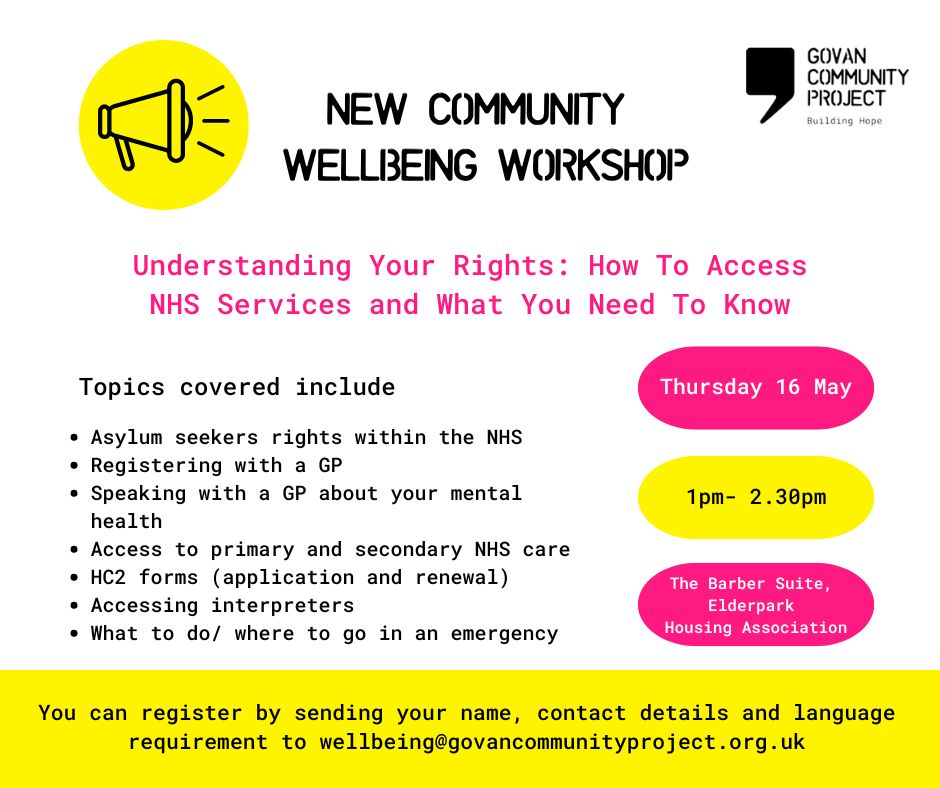
In March, GCP staff and members of our Ending Destitution Together Group attended the No Accommodation Network (NACCOM) annual conference, which promotes shared learning and good practice amongst members.
The Guardian’s Social Policy Editor, Patrick Butler, was the keynote speaker who talked about the current political and media context surrounding refugee and migration issues. He discussed the important role journalism can play in highlighting injustice and inequality and promoting compassion instead of hostility.
Other speakers included Reneae Mann, from the Refugee Council, Eiri Ohtani from Right to Remain, and Sonia Lenegan, Editor of Free Movement and asylum and public law solicitor. Participants had the opportunity to take part in workshops on themes such as setting up and diversifying housing models, working with people with complex needs, setting up and running lodgings schemes for newly granted refugees , safeguarding support in storytelling and working with the media, influencing in a general election year and building lived experience representation.
Wellbeing was a large feature of the day with all participants enjoying some amazing food and taking part in various mindfulness activities throughout the day.
We asked our group members to tell us the key things they took away from the conference:
● Importance of raising awareness/education
● The power in tackling challenges together
● No one deserves to be homeless, humanity and collaboration is so important
● Planning, mitigation and advocacy are key factors for influencing change
Feedback from our group members on their attendance was very positive and they felt the quality of the keynote speakers was very high.
One group member said: “It was a good experience to attend this kind of conference for the first time outside of Scotland. It was good from a learning point of view, to understand housing issues and case studies. Very practical approaches and we made good relationships with other organisations.”
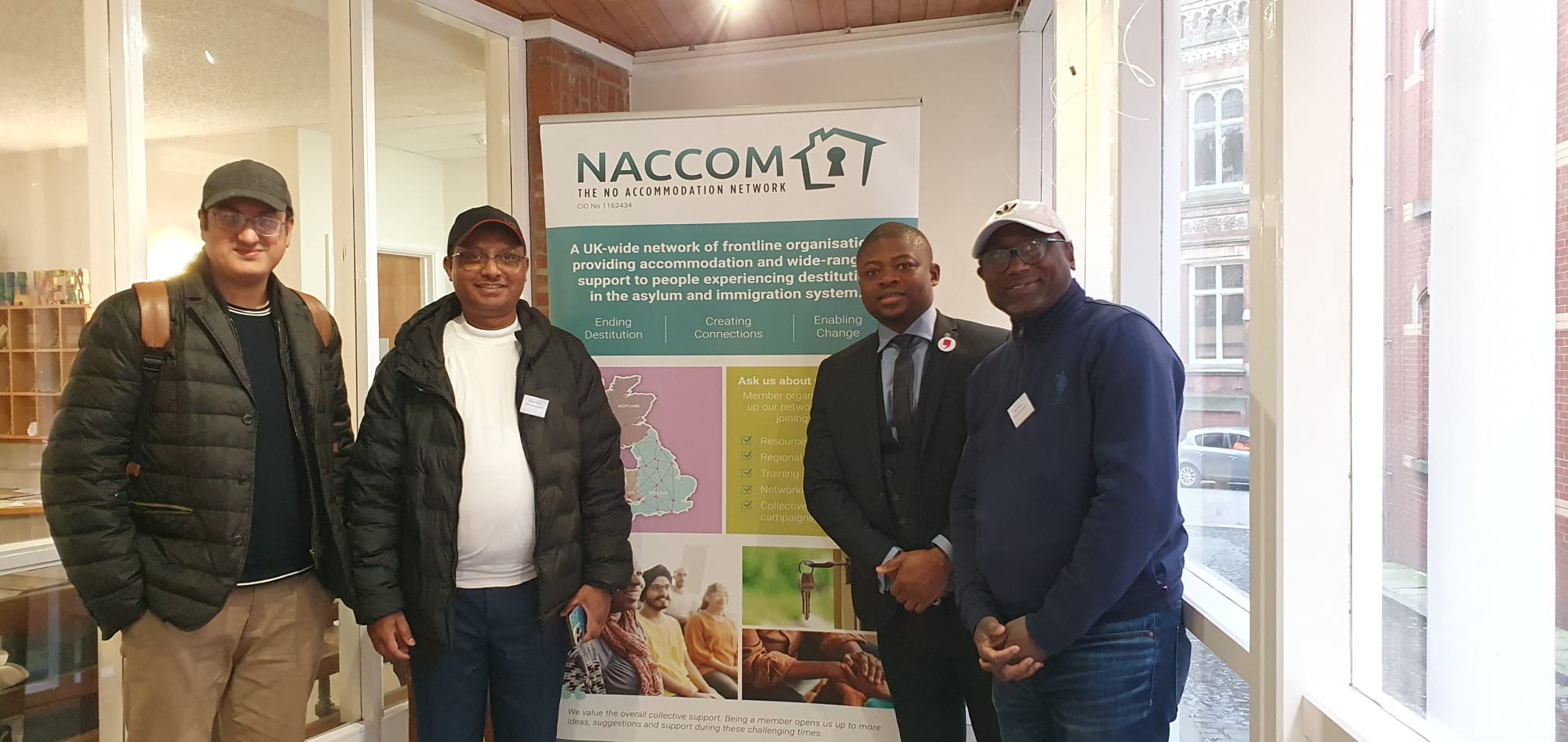
The UK Government has passed the Rwanda Safety Bill, below is a statement from Govan Community Project in response to this:
We are absolutely devastated and disgusted at the passing of the Rwanda Safety Bill in Parliament. This enables our government to completely ignore human rights and break international law. Despite being ruled by the Supreme Court as unsafe, our uncaring government will forcibly remove people seeking asylum, including children, to a country where they are at serious risk of harm and abuse.
Time and time again, research on the views of the public show that this is not what the majority of the UK population wants. Communities up and down the UK provide a welcoming, safe space for refugees and recognise the value diversity brings to our society.
Instead of this cruel, heartless, ineffective and costly scheme, we stand in solidarity together with refugees and our colleagues across the sector and call for a new plan that recognises and respects human rights and treats everyone fairly and kindly.
We call on all of our friends, neighbours and colleagues across the country to continue to call out the UK Government on their inhumane, harmful policies.
Govan Community Project has signed a letter to the Prime Minister, along with over 250 other organisations, to express our outrage at this law. Read the letter here.
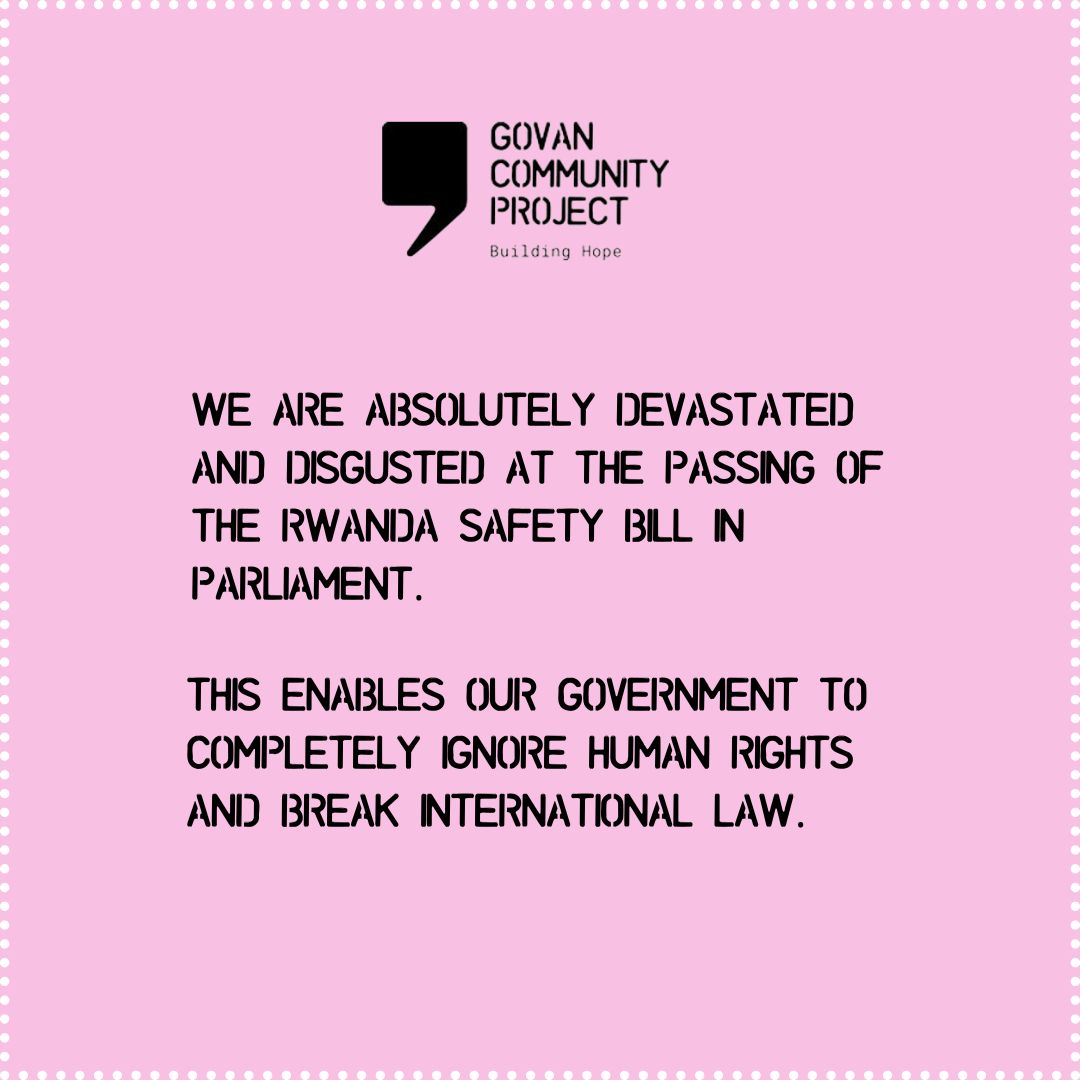
Next month Govan Community Project will host it’s first fundraising event of 2024. Back to the 80’s is a night of live music, dance and a charity raffle to raise vital funds to support refugees in Glasgow.
The event, which will take place at Fairfield Club in Govan on Friday 10 May, is set to feature live music from The Moonlighters who will perform classic hits from the 80’s. The evening will continue with a buffet and a DJ.
Megan Johnson, GCP Fundraiser, said: “Community support is essential to our work. Every penny we raise helps us to support people who have very little or, in some cases, face destitution and homelessness. This event will be a fun space for us to come together in community spirit as well as for some dancing, food and an opportunity to win some wonderful raffle prizes, which have been kindly donated by businesses in our community.”
Tickets are £10, there is also a £15 option which includes a donation. Pay-it-forward option is also available to buy a ticket for someone on low/no income.
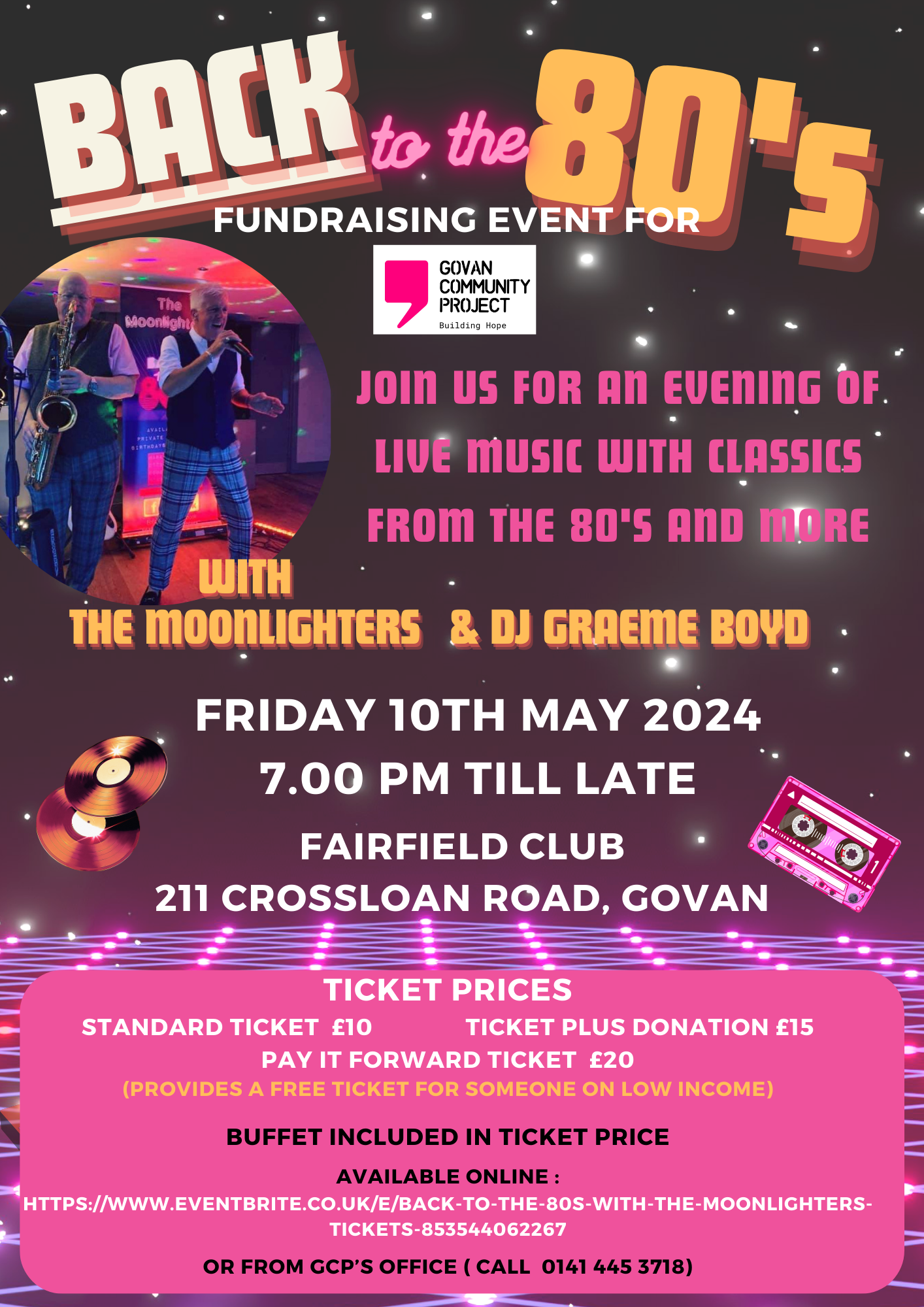
Since 2020 the Food For All group, in collaboration with Nourish Scotland , has worked on the Dignity in Practice Project with funding from the Scottish Government’s Fair Food Fund. One participant – Aaliyah* – has been an integral part of the group for several years and has facilitated workshops, co-designed resource materials and supported other group members throughout the duration of the project.
Reflecting on the positive difference that the group has made on her life in Glasgow, Aaliyah recalled: “My confidence was at zero when I first came to the Food For All (FFA) group. However, since joining the group, there is a huge difference in how I see myself now. Every time I engage in this group I feel very proud.”
The asylum journey is incredibly gruelling and undignified. Thinking back to her life a few years ago, Aaliyah said: “The asylum journey feels like it destroys you. You feel that you are helpless and that you have nothing. You feel like you are nothing because you are not able to contribute to anything.”
Despite feeling in despair about her journey through the asylum process, Aaliyah decided to join the FFA group. She told us about the many conflicting emotions she felt at the time. “I was very nervous because there were a lot of things I couldn’t do. How could I speak in front of a group of people when my English was not good? I was not well connected in the community. I was not feeling very confident.”
Aaliyah was attending a number of different community groups at the time she joined FFA, sharing stories of the asylum process. The FFA group is the one group that Aaliyah connected with the most and sees herself continuing with.
“All the other groups felt temporary. You can go and spend an afternoon there having tea, but once their funding is gone then there is no impact. I am [now] out of the asylum process, but I am still stuck there because this was my journey. My friends are still in the asylum process and they are still struggling. Because they are struggling, I am struggling, because I can feel their pain. I haven’t heard from those groups in a long time, however the FFA group is still going strong and it makes me feel like we are bringing about change.”
Aaliyah said the FFA group has had an overwhelmingly positive impact on her confidence. “Since joining the group I now feel such a change and when I am presenting in front of a big group I realise how far I have come. I had the feeling before that ‘no one listens to asylum seekers’ and that ‘the response has been very bad’. However, with the Food For All Group, the last workshop that we did face to face, I really felt that people do want to learn more about the asylum journey and how people are struggling.”
The importance of sharing space with other people who have been through the asylum process is very important to Aaliyah. The success of the FFA group is evident through the strong support that the group members provide to each other. Aaliyah told us she feels 100% supported by the group both in sessions and also when delivering workshops.
She added: “The FFA group is a strong, and unique team because the group is comprised of members with different, individual personalities; this makes us a great team. When I joined this group, I remember I was a bit shy and I wanted to say something. Sara was in the same journey as me and I was stuck with my words and she came in and she knew what I was trying to say, she helped me to find the right words to say it. I felt very grateful that she knew what I was thinking. It makes you feel that you are not alone. You are in a group of people that understand you. They see you.”
Aaliyah is hoping to see positive change for herself, the group members and the whole asylum system.
*Name changed to protect anonymity
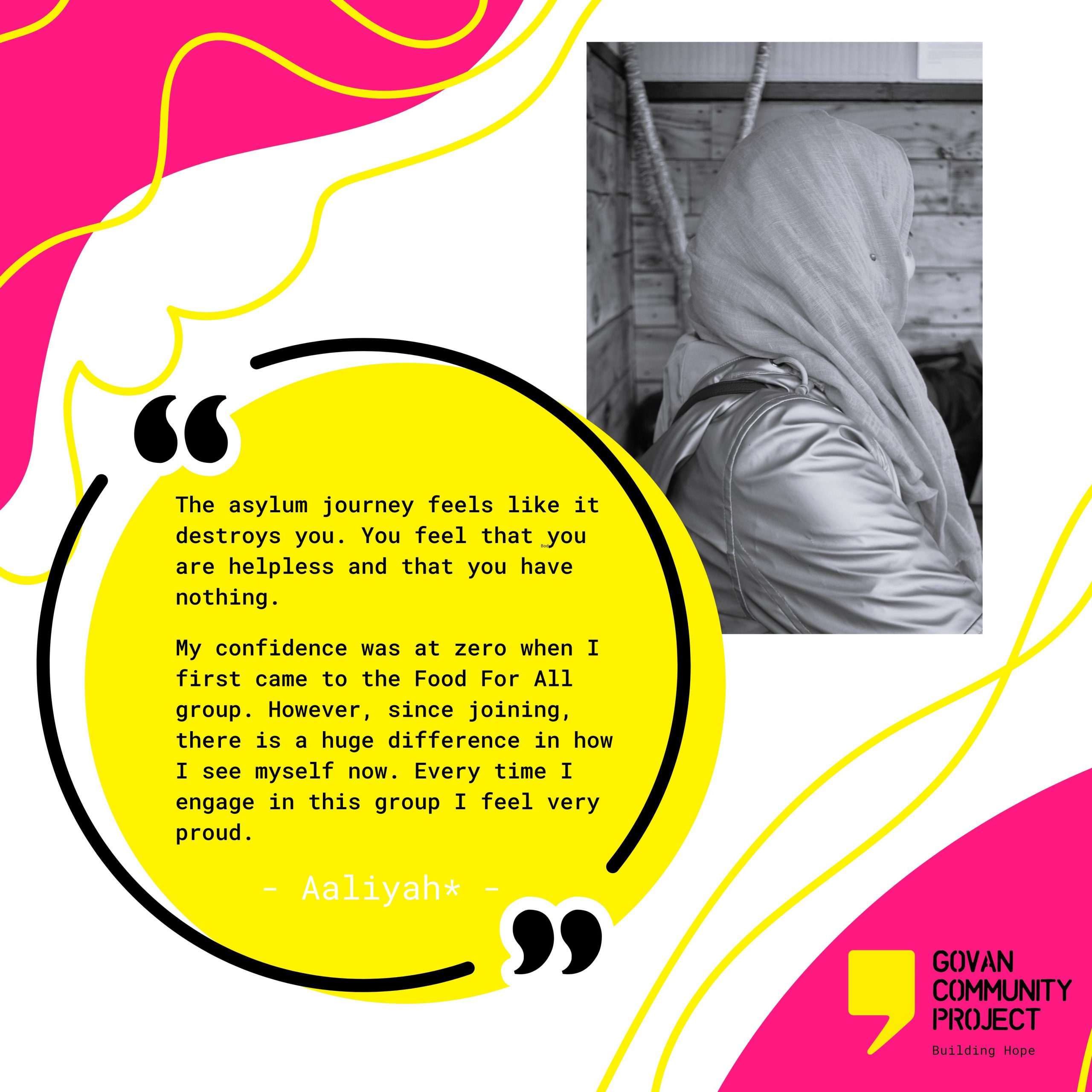
December is always a busy month for our Homework Club, with lots of festive activities taking place.
Kezia, Homework Club Project Lead, explains a bit more about what the kids got up to over the festive season and shares some exciting news they’ve received in the new year.
“In December our high school attendees were busy revising for prelims, while the primary school attendees enjoyed the winding down of homework from school, which means more time for crafts, games and fun. We recently got an old Nintendo Wii console, and while the kids thought this was pretty retro (we got some eye rolls at first) everyone has had great fun with it. Some classics never go out of style!
It was lovely to see some of our Homework Club attendees and their families attend the GCP Christmas
Party in Govan too. It’s always good to meet parents and other GCP community members outside of our project. We ended the year with back-to-back fun, with a Christmas party with games and extra snacks on the last Monday session of the year, before an extra special trip to the Pantomime at the Pavilion Theatre on the Tuesday. The Panto trip is always a highlight! We were especially grateful to receive funding from Safe Deposit Scotland Community Fund, which financially supported us to take the 28 kids and teens, and six staff and volunteers along to the Panto. Thank you for supporting our work.
A special mention to Glasgow Spirit of Christmas, who we partnered again with this year. They do incredible work to make sure every child in Glasgow can wake up on Christmas day with presents from Santa, and experience the magic of Christmas.
Our staff and volunteers then enjoyed well-earned time off. The winter holidays are the only school holidays that aren’t filled with extra activities and trips, giving staff and volunteers time to rest, relax, and enjoy time with loved ones.
Homework Club started back on 17 January 2024 (despite some eager faces showing up two days before…sorry for turning you away, we love the enthusiasm!). We have dived straight into busy homework schedules, but will always find time for a couple of games of Uno and some drawing.
We are also very excited to share that we started 2024 with some special news.
The Homework Club has been awarded funding by the Orp Foundation, which has increased staff capacity across the team, and will allow us to develop the project. What a way to start the year!”
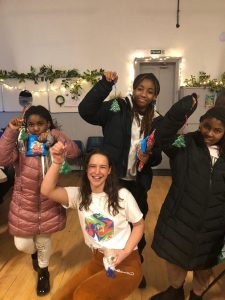
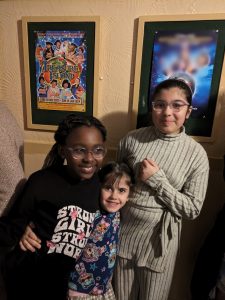
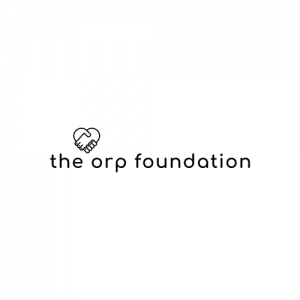
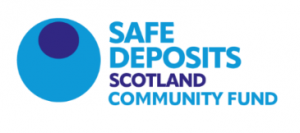
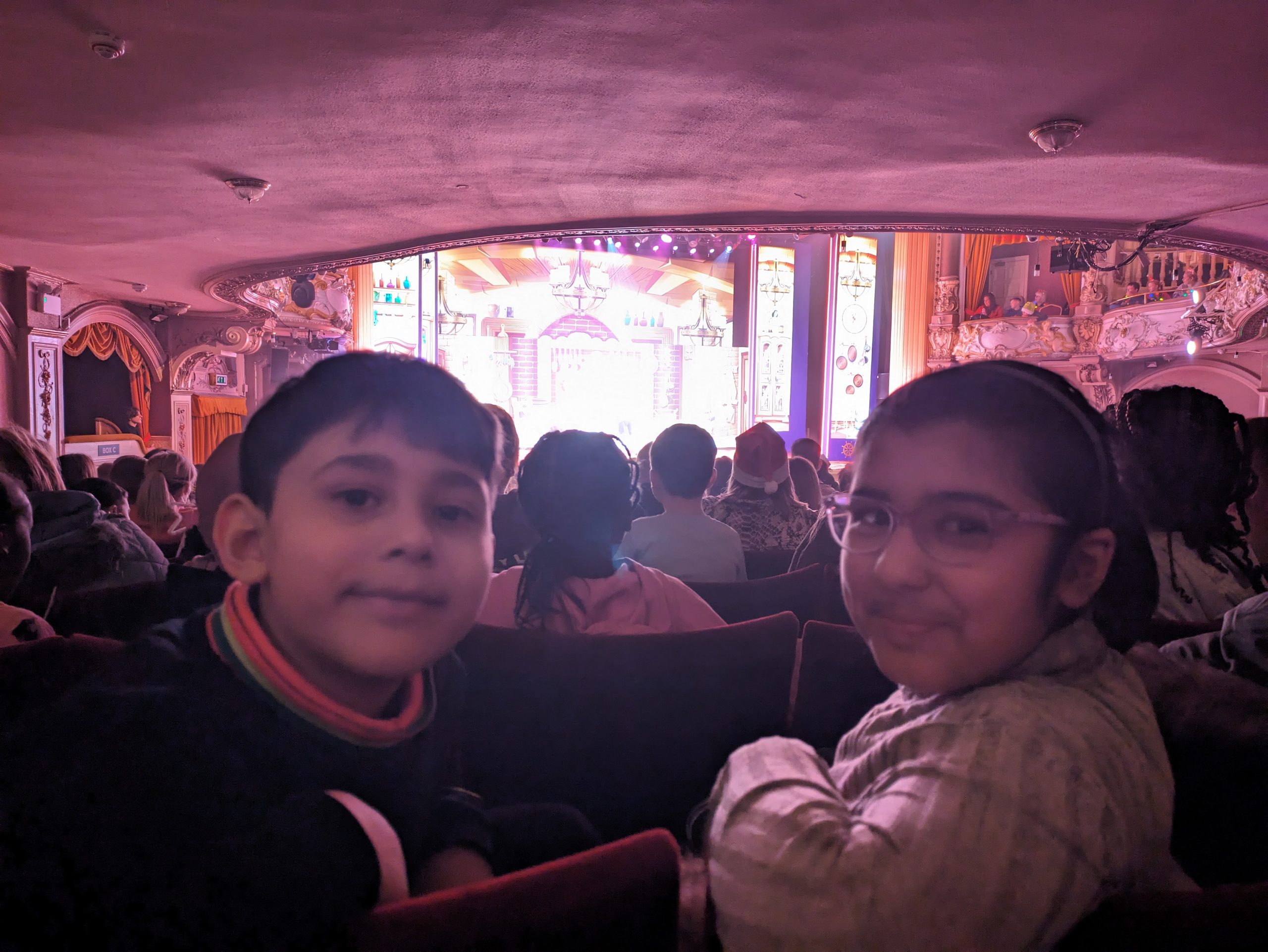
Govan Community Project was recently invited to Comic Relief’s Across the Borders Summit.
Our Head of Charity, Traci, and our Men’s Group Coordinator, Rago, were delighted to travel to Athens to attend the event in November.
Organisations supported by Across the Borders were given the rare opportunity to meet, collaborate and explore the development of Comic Relief’s strategy to work towards supporting a more inclusive migrant-led sector by 2030.
The summit was attended by 17 organisations, with a mix of representatives from organisations across different nations including UK, Greece and Egypt.
Traci Kirkland, Head of Charity, said: “One of the most valuable strengths of the summit was the level of solidarity and transparency, which created a safe supportive space for engagement in activities and conversations, sometimes on very challenging subjects. It was a real privilege to be part of a process that held the inclusion of personal lived experience as a main focus.”
During the summit the group drafted five strategies for Comic Relief to take back and consider in relation to future funding and development strategies. The themes identified were investing in employment pathways, catalysing refugee leadership, building a people-centred trauma and identify informed movement, enshrining meaningful inclusion- including modelling this to the wider sector- and driving funding to migrant led organisations.
Comic Relief will use these points to review how their organisation can support putting some of this into action.
Traci added: “I am excited to see the future outcomes of the work which started in Athens, but is still ongoing. We would like to thank Comic Relief for the amazing opportunity, we had an amazing time, both during the workshops and in our down time. We really look forward to continuing to work with Comic Relief on this really important piece of work.”
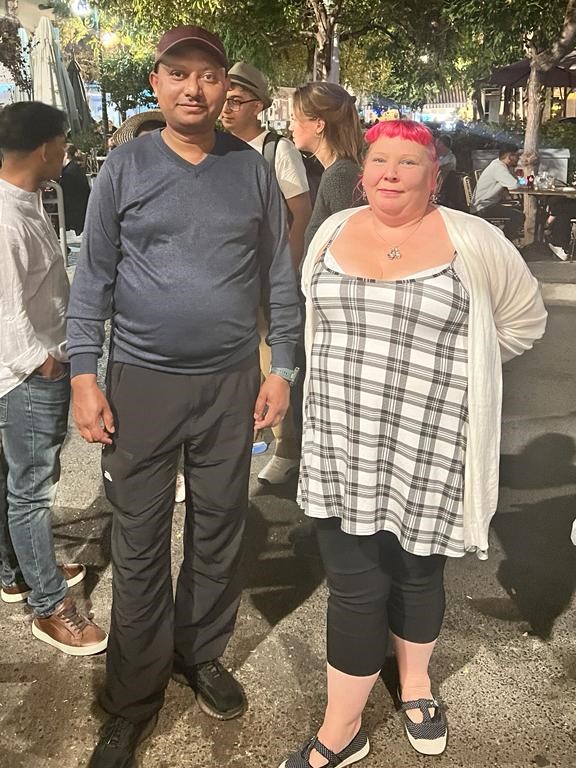
First Minister Humza Yousaf visited Govan Community Project today (Friday 12 January) to hear about the work the charity is doing to support refugees in Glasgow.
Mr Yousaf was greeted by staff and community members at the charity’s office in Govan.
Govan Community Project provides an advice & advocacy service, support with food insecurity, language classes and community groups to reduce social isolation, for refugees and those seeking asylum.
During the visit, Mr Yousaf met with head of charity, Traci Kirkland, who outlined the current challenges facing the sector. He also spoke to members of the community groups, many of whom are currently in the asylum system, about their concerns around housing, education, employment and public transport.
Traci Kirkland, Head of Charity, said: “We were really happy to have Humza Yousaf visit our new office building in Govan today. With the asylum and refugee community facing ever increasing challenges from the UK’s hostile environment, we welcomed the opportunity to share our experiences with the First Minister; he answered a whole host of questions from our community members. It was good to hear how much he values the work Govan Community Project does.”
We spoke to some of our community members to get their thoughts on the First Minister’s visit.
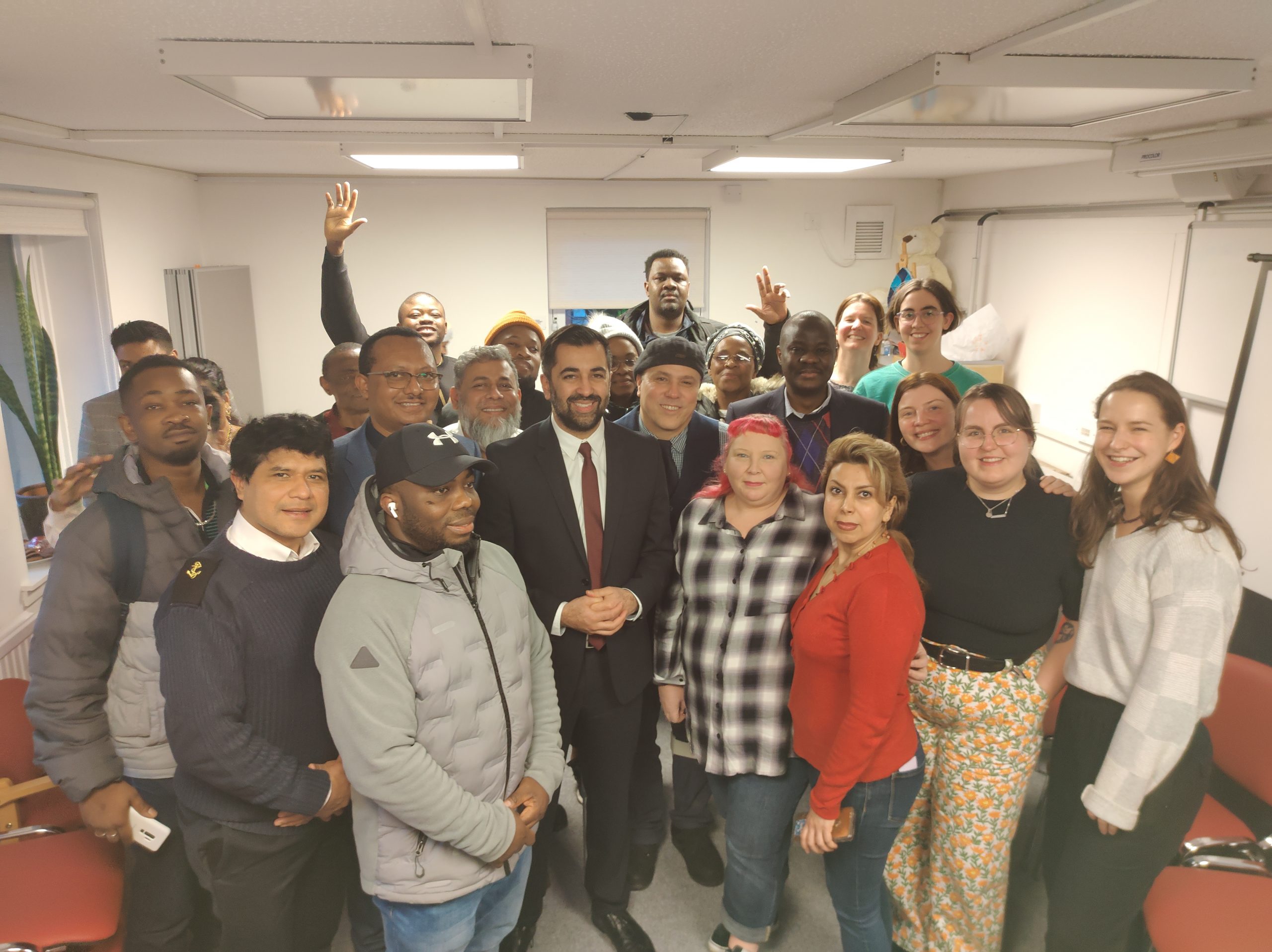
At the end of November GCP organised an Introduction to Gender Diversity training for staff and volunteers. Here GCP Volunteer Coordinator, Petra Hardie, outlines the training and what the organisation took from it.
The training, delivered by Lou Beardsmore from Pride Outside, helped to ensure the team is up-to-date with LGBTQ+ language and policies. Lou made sure that prior to the training we were able to ask questions anonymously on the subject and provided space within the training for more questions and guided discussions.
The training linked research theory with practice, and outlined the vital importance of inclusive language and how frequently it changes. We spent time learning about best practice around pronouns and why this is important for the LGBTQ+ community. This learning will support the organisation in looking at what steps we can implement to show that GCP is an LGBTQ+ ally.
A helpful emphasis in the training was the importance of the approach of ‘calling people in’, meaning
when we identify homophobic or transphobic remarks to respond compassionately and recognise that often people do not recognise that the language they use is not inclusive or is disrespectful.
As a follow on from the training, GCP has identified some simple initial steps we will take to ensure we are more gender inclusive. Some simple steps will be taken immediately, such as
- developing an organisational inclusion statement
- ensuring everyone in the organisation understands their role in inclusion
- adopting pronouns in email signatures
We are also committed to further development of policies and procedures to ensure they reflect our
commitment to inclusion.
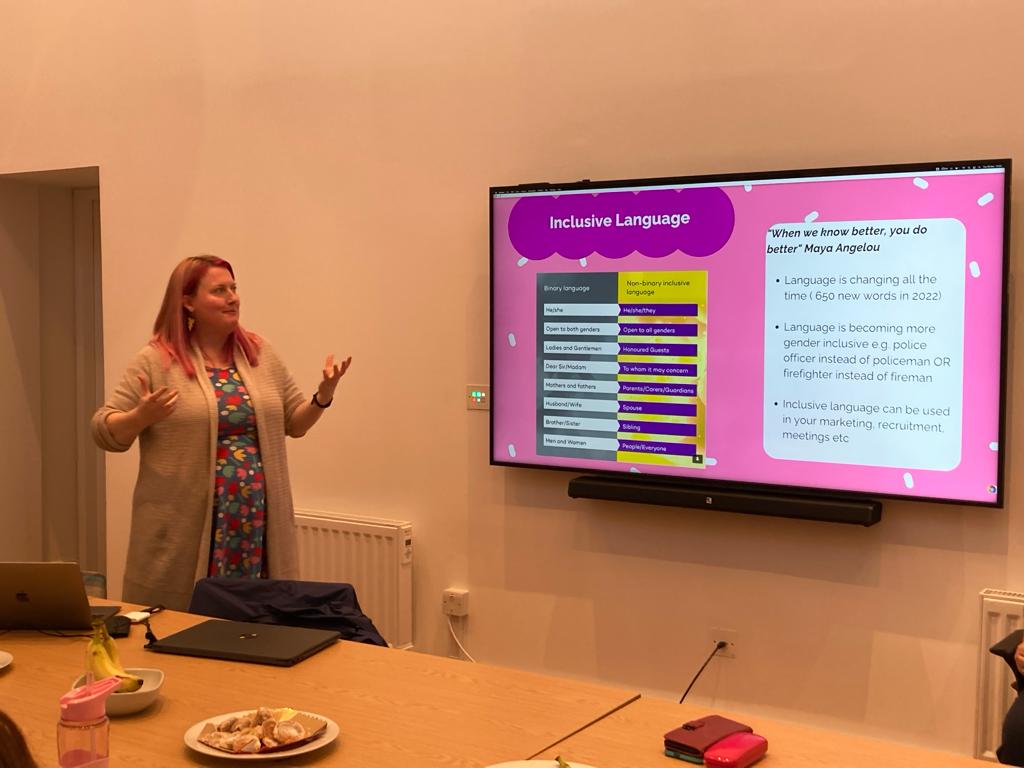
The Food For All group is launching resources and workshops that are designed and delivered by people with lived experience of the asylum process. The Food For All: Dignity In Practice workshop is aimed at staff and volunteers delivering community food services, and provides space to reflect and learn from the very people who use those services.
This workshop is being offered at a time when there is a human crisis right here on our doorstep. Asylum seekers are navigating a maze of barriers and obstacles to employment, education and food. The Food For All group raises awareness of the specific challenges people in the asylum process face, building understanding and empathy for those in that system, and inspires food providers to embed dignity in the heart of their practice.
Philippa Roloff, Food for All Project Lead, said: “We believe that everyone deserves dignified access to food. We believe that everyone working in community food provision should have the opportunity to gain knowledge and understanding of the asylum process, to adapt their practice and break down the barriers faced by community members in the asylum process.”
Through collaboration with Nourish Scotland, the Food For All group has been working on the Dignity In Practice Project since 2020. We are delighted to finally be sharing the expertly created workshop with community food providers. Our FREE, certified workshops are an opportunity for teams to come together with people with lived experience of the asylum system in a safe space to reflect and learn from each other.
By better understanding each other’s needs, we can help build capacity in community food settings and the communities they serve, to support each other and promote the dignity of everyone.
On November 24th , 2021, a group of people – each unique and dearly loved – slowly froze to death in the icy waters of the English Channel while waiting for a rescue that never came.
Twenty-seven bodies were recovered and four are still missing, adding to the pain of the families – twenty-one men, seven women including one who was pregnant, and three children.
Today, two years on from this tragedy, we remember and honour them, alongside many more precious lives lost on dangerous journeys to the UK – we may never know exactly how many.
On that catastrophic night, their flimsy boat left France at around 10pm, but close to midnight, it began to deflate and sink in the middle of the Channel. Between 2am and 4am, the passengers called the French and English authorities many times begging for help. But no one came.
The French authorities told them they were in British waters, and British officials told them they were in French waters. The transcripts of those desperate calls make for difficult reading – one passenger indicates that they are literally “in the water”. “Yes, but you are in English waters, Sir,” is the reply. At around 3am the boat overturned, tipping all passengers into the water, where some drowned because of the waves. Over time, others resigned themselves to letting go as they were overwhelmed by the cold.
Eleven hours later – at 2pm the next day – a French fisherman spotted the bodies in the water and raised the alarm. When the French coastguard finally arrived, they found only two survivors.
We will never let the lives lost that night, or those of loved ones lost since, be forgotten. And for their families, we demand justice and change. We long for people seeking safety on British shores to be seen as human beings, deserving of rights, compassion and dignity. Tragedies like this occur because of the ‘othering’ our politicians insist on – of the dehumanising of sons and fathers, mothers and daughters,
friends and family members.
This rhetoric must change. And so must this government’s policies. Humans in search of safety deserve just that. This means safe routes for all refugees wishing to come to the UK – we need to improve resettlement and refugee family reunion schemes and make it easier for people to travel to the UK to claim asylum. That is the only way these tragedies will end. We stand alongside the families of the victims, as they demand answers as to why French and British authorities failed desperate people who came asking for help. They also need to know when the results of the Article 2 Inquiry will be made public. The families have already waited two long years and deserve answers.
As a society that values compassion, we know that people fleeing the worst the world has to offer should be met with kindness. So, we demand that the division and fear of anti-migrant rhetoric used by some political leaders, is replaced with the empathy and respect that many people and communities across Britain show to refugees every day. We can, and must do better : people’s lives depend on it.
Signatories
Zana Mamand Mohammad relative of Twana Mamand Mohammad
Mstafa Mina Nabi relative of Zaniar Mstafa Mina
Rasul Farkha Husein relative of Pshtiwan Rasul Farkha
Saman Abubakir Alipour relative of Sirwan Abubakir Alipour
Husen Mohammad relative of Mahammad Husen Mohammad
Sarhad Pirot Mohammad relative of Sarkawt Pirot Mohammad
Shamal Ali Pirot relative of Shakar Ali Pirot
Ahmad Mohammad Akoyi relative of Afrasia Ahmad Mohammad
Abdulkarim Hamd Abdulrahman relative of Bryar Hamd Abdulrahman
Ismail Hamd Qadir relative of Muslim Ismail Hamd
Rizgar Husen Hamd relative of Kajal Ahmad Khizir
Hadye Rizgar Husen
Mubin Rizhar Husen
Hasti Rizgar Husen
Yasin Husen Hamd relative of Rezhwan Yasin Hasan
Qadir Abdullah relative of Mohammad Qadir Abdullah
Omar Mohammed relative of Hassan Mohammed Ali
Ali Mohammed relative of Hassan Mohammed Ali
Emebet Kefyalew Gizaw relative of Fikeru Shiferaw Tekalegn
Calais Appeal
Care4Calais
Freedom From Torture
Refugee Action
Refugee Council
Safe Passage
Scottish Refugee Council
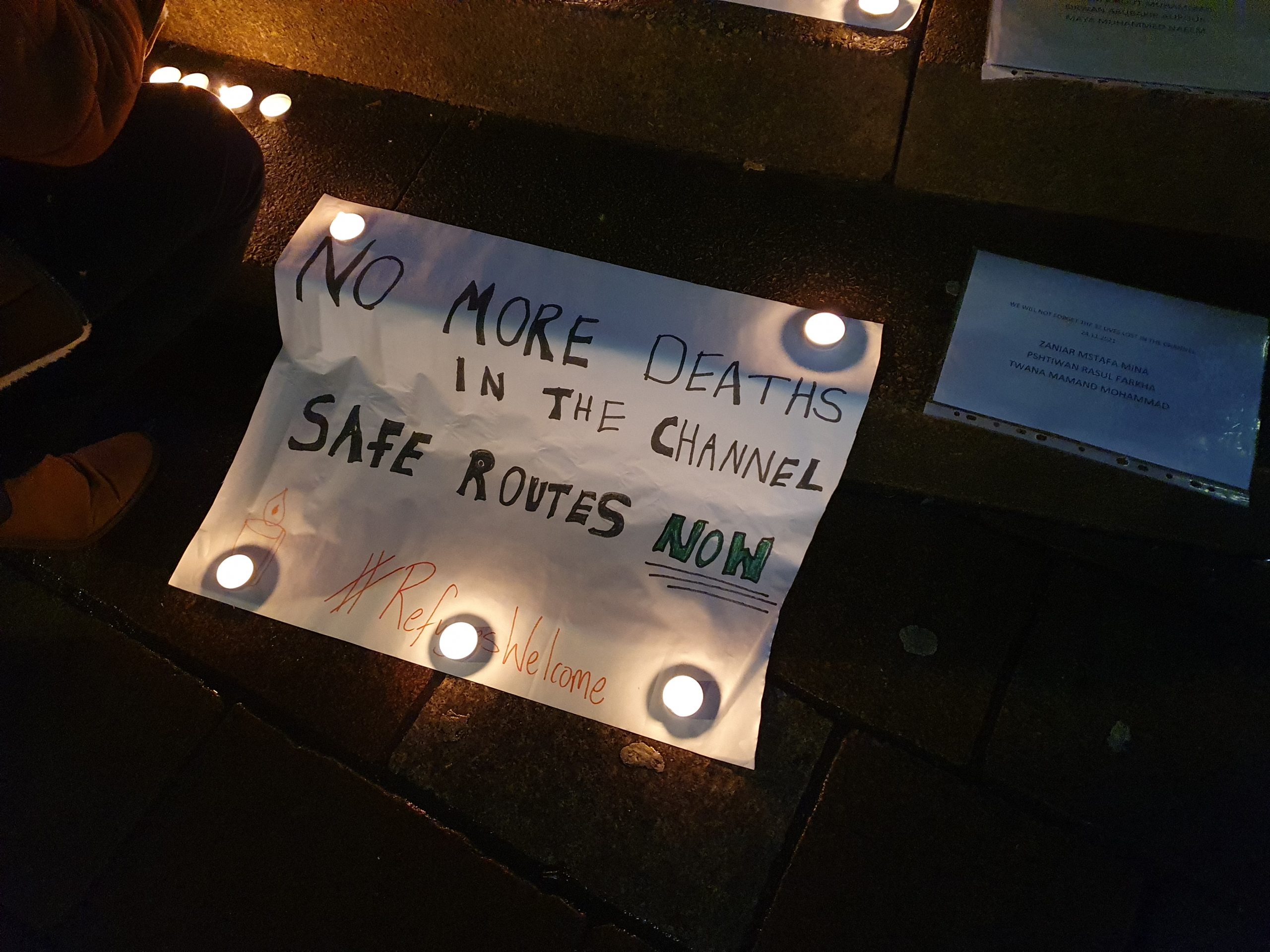
Today (Wednesday 15 November) the Supreme Court ruled the UK Government’s Rwanda plan is unlawful.
Govan Community Project is very happy that the correct ruling was made by the Supreme Court on the Rwanda Plan, however we share continued concerns with our colleagues across the sector of the UK Government’s ongoing inhumane treatment of those seeking safety.
We stand with over 100 of our sector colleagues, issuing the following joint statement.
We are relieved today that the Supreme Court has made the right decision and declared that Rwanda is not a safe country for this government to send people needing safety. The Rwanda plan was always cruel and immoral. We urge the Government to immediately abandon such plans with Rwanda or with any other country, and instead protect the rights of people who have come to our country in search of sanctuary.
While we welcome the decision today, we remain concerned by this Government’s overall treatment of people who move to this country. We are alarmed by this Government’s continuous efforts to detain and forcibly send people to countries where they may not know anyone, especially if it puts them at risk of harm and human rights violations. We know that as a community we are compassionate and welcoming, and we need immigration policies that are rooted in that same care, compassion, and respect for human rights. We call on everyone to stand up for the rights of people seeking sanctuary, regardless of where they come from or how they travel here.
Signed (as of noon Wednesday 15 November 2023)
- Joint Council for the Welfare of Immigrants (JCWI)
- BARAC UK
- Kalayaan
- Liberty
- Doctors of the World UK
- Welsh Refugee Council
- Medical Justice
- Focus on Labour Exploitation (FLEX)
- Rainbow Migration
- Bail for Immigration Detainees
- Just Fair
- René Cassin, the Jewish voice for human rights
- After Exploitation
- Freedom from Torture
- Latin American Women’s Rights Service (LAWRS)
- North Wales Regional Equality Network
- Young Roots
- Anti Trafficking and Labour Exploitation Unit (ATLEU)
- Association of Visitors to Immigration Detainees (AVID)
- Every Child Protected Against Trafficking (ECPAT UK)
- Humans for Rights Network
- Hibiscus Initiatives
- Committee on the Administration of Justice (CAJ)
- Scottish Refugee Council
- Helen Bamber Foundation
- Asylum Aid
- The William Gomes Podcast
- Routes Collective
- New Citizens’ Gateway
- CARAS
- West London Welcome
- Student Action for Refugees (STAR)
- Afghan Association Paiwand
- RefuAid
- IMIX
- Gatwick Detainees Welfare Group
- Kent Refugee Action Network (KRAN)
- Our Second Home
- Samphire
- Care4Calais
- St Augustine’s Centre, Halifax
- Greater Manchester Immigration Aid Unit
- Good Chance Theatre
- The Runnymede Trust
- Hope at Home
- Voices in Exile
- Refugee Support Group (Berkshire)
- Ice and Fire Theatre
- Waging Peace
- Reading City of Sanctuary
- forRefugees
- Cambridge Convoy Refugee Action Group
- Hastings Supports Refugees
- Cambridge Refugee Resettlement Campaign
- Hastings Community of Sanctuary
- Herts for Refugees
- City of Sanctuary UK
- Bristol Refugee Rights
- Da’aro Youth Project
- Reunite Families UK
- Migrants’ Rights Network
- Public Law Project
- Praxis
- Refugee Action
- Together with Migrant Children
- JRS UK (Jesuit Refugee Service)
- Here for Good
- Refugee Council
- the3million
- Open Rights Group
- National AIDS Trust
- Anti-Trafficking Monitoring Group (ATMG)
- Asylum Matters
- HIAS+JCORE
- People in Motion
- Refugee and Migrant Centre (West Midlands)
- RAMFEL
- Refugee Women Connect
- Voices Network
- Micro Rainbow
- LGBT Health and Wellbeing (Scotland)
- The VOICES Network
- Mermaids
- HOPE not hate
- African Rainbow Family
- Manchester Migrant Solidarity
- Safe Passage
- Birmingham City of Sanctuary
- Birmingham Schools of Sanctuary
- Haringey Welcome
- House of Rainbow CIC
- Asylum Welcome
- Anti-Slavery International
- LGBT Foundation
- Migrants Organise
- Hope and Aid Direct
- Inclusive Mosque Initiative
- Alawia SBI
- JustRight Scotland
- Kanlungan Filipino Consortium
- Time To Be Out
- TransActual
- Durham Visitors Group
- Lewes Organisation in Support of Refugees & Asylum Seekers
- RefYouMe
- Reclaim The Sea
- Big Leaf Foundation
- Freedom United
- Muslim Council of Britain
- Global Link
- Lesbian Asylum Support Sheffield
- Asylum Support Appeals Project
- Gendered Intelligence
- Migrant Voice
- Stand For All
- Migration Justice Project, Law Centre NI
- NACCOM
- Refugee Legal Support
- South Yorkshire Refugee Law and Justice
- Choose Love
- Refugee and Migrants Forum of Essex and London
- Leeds Asylum Seekers Support Network
- Nottingham Arimathea Trust
- Govan Community Project
- Simon Community Scotland
- Welcome Churches
- The Pickwell Foundation
- Refugees at Home
- Stonewall
- Sahir House
- Southeast and East Asian Centre (SEEAC)
- Room to Heal
- Commonwealth Human Rights Initiative
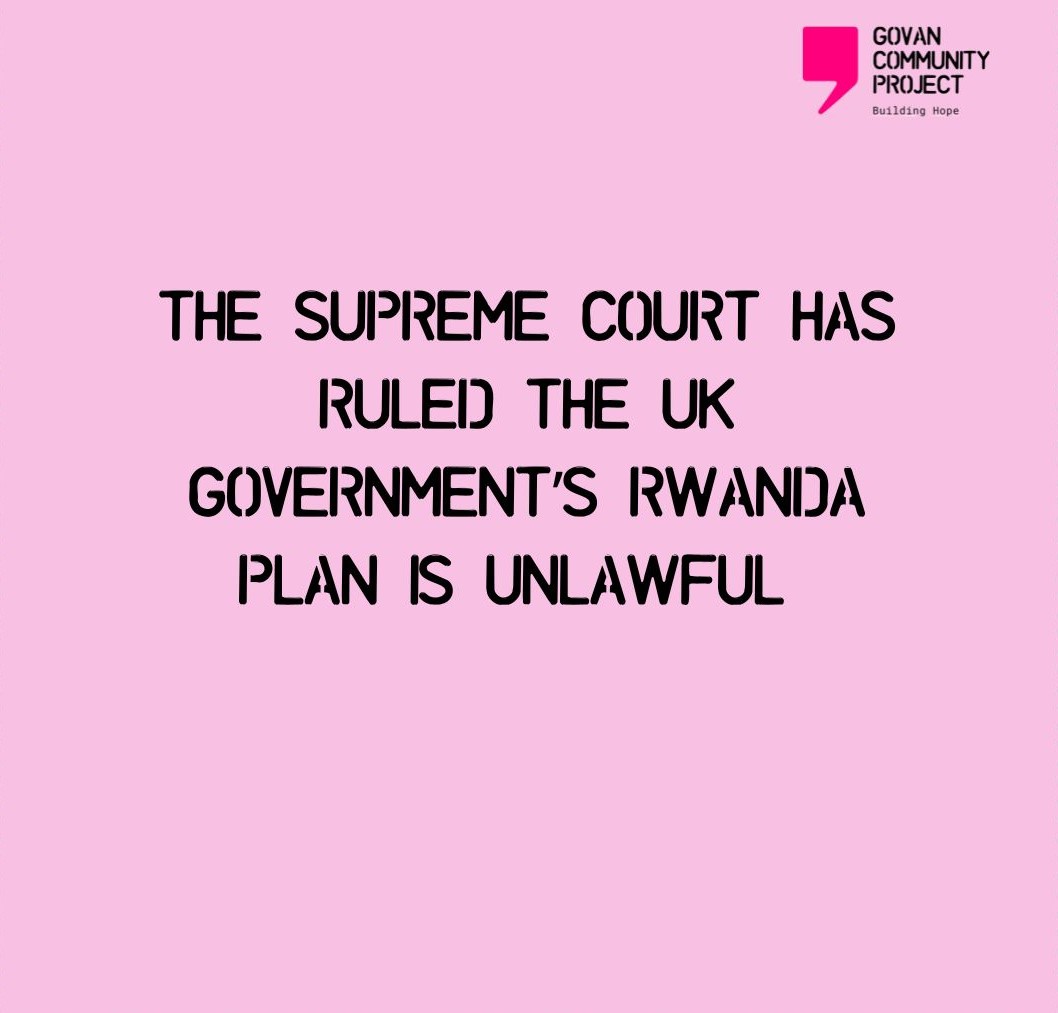
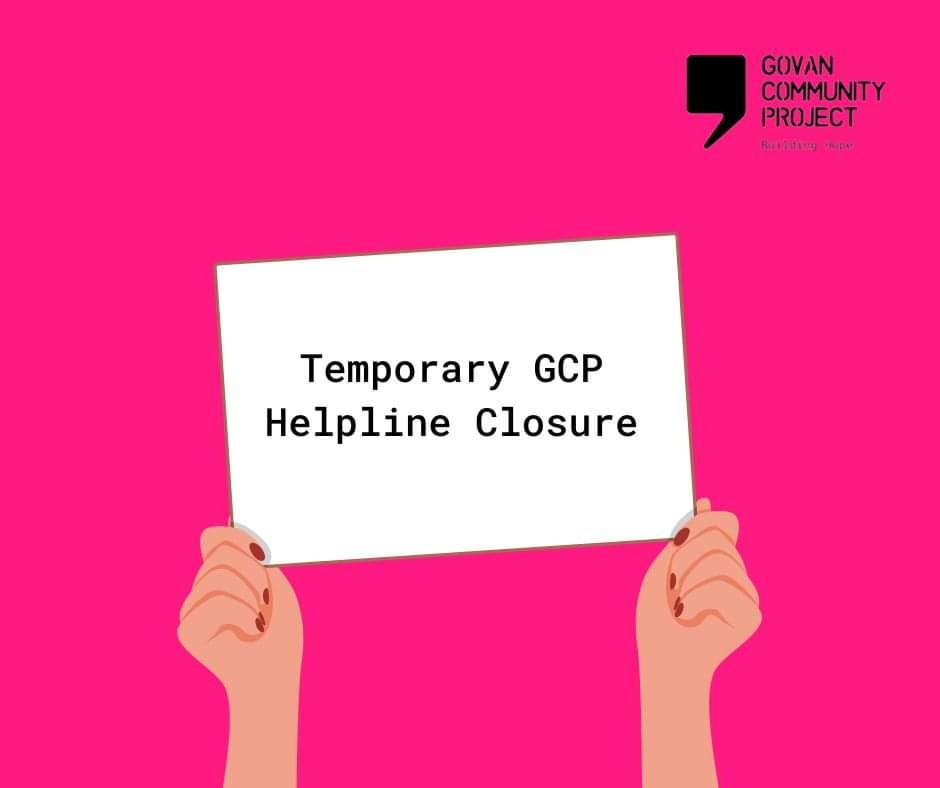
Govan Community Project has recently started a new year-long project called Ending Destitution Together (EDT).
GCP, in partnership with the Scottish Refugee Council, previously worked closely with the Scottish Government and COSLA on the development of the Ending Destitution Together Strategy. The strategy aims to improve the outcomes and support options for people with No Recourse to Public Funds (NRPF) living in Scotland.
Our new EDT project represents communities affected by the UK government’s NRPF policy, made up of group members with lived experience.
The group has started planning their year-long research and advocacy project, with meetings with the Scottish government as well as partnerships with a range of national and local organisations to give our political leaders a solid understanding of the effects of destitution on Scotland’s population.
We spoke to our Ending Destitution Together Coordinator Rago to find out more about the project.
Who is involved in the Ending Destitution Together project?
The Participatory Action Research (PAR) group is a group of people from across Scotland who have lived experience of destitution or who are at risk of destitution with NRPF by the current UK immigration policy. Some are survivors from destitution in the past, others are currently faced with this situation.
The project ensures that the voices of individuals directly impacted by destitution/risk of destitution caused by immigration policy are heard, and their knowledge and experiences valued as equal co-production partners in policy development. We say nothing for us without us.
What will the research look at?
Many people are facing destitution for different reasons; it could be someone who had their asylum claim rejected and is awaiting appeal, or someone whose visa has expired, but they have no place to go. These people have NRPF, so they can’t fulfil their basic needs. If you can’t work or access public funds it’s very hard. I have seen some people destitute for a period get back into the system, some can be stuck in this cycle for 15 or 20 years. Image a person stuck without status for 20 years, what can they do?
People have individual needs, but there’s also general needs. We will be researching what sort of things would be helpful to those people, what kind of support they need from the government and local authorities. In my other role as the GCP Men’s Group Coordinator, I noticed how many barriers people face, but they don’t talk about it. So first we need to build trust for people to share.
What do you hope to achieve?
We have one year to do this research, to speak to people across Scotland to understand all the issues. From this research we are hoping to get an accurate account of the situation and use it as evidence to present to the Scottish Government.
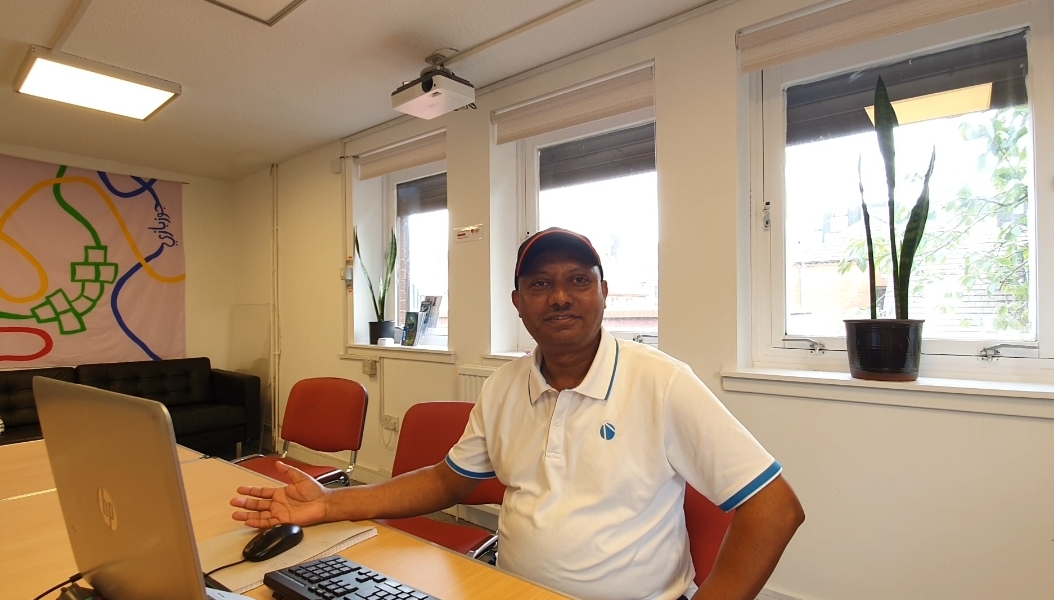
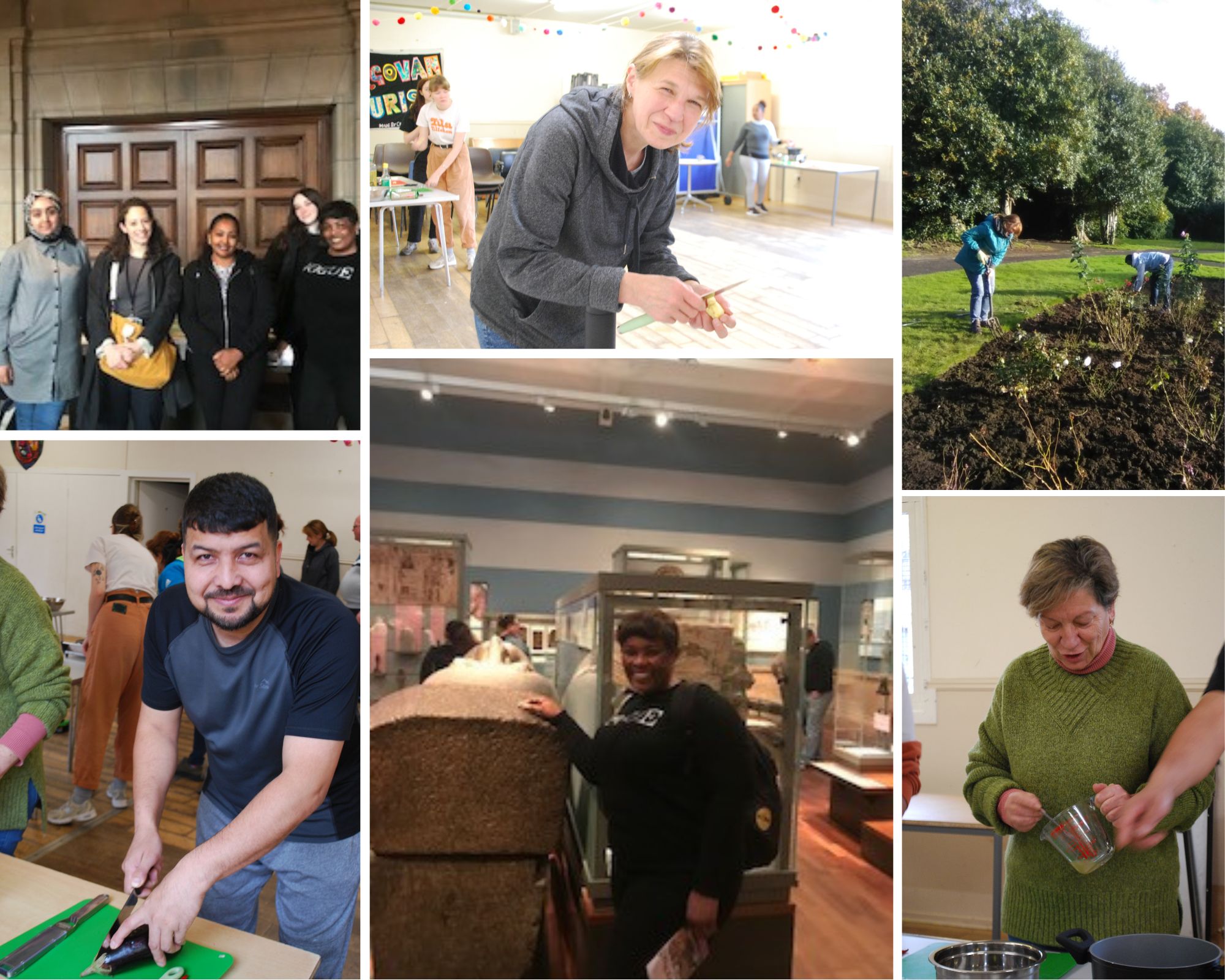
Govan Community Project has teamed up with Govan Sports Hub to start a Couch to 5K in Govan. It’s free and starts on Monday 6 November from 9.30- 11am.
It’s aimed at complete beginners, we have qualified coaches to get you started. The course will run for 12 weeks.
The group will be meeting at the Govan Community Project Office, 31 Garmouth Street, Govan, G51 3PR.
You can register for the Couch to 5K here. If you would like more information about the sessions email aileas@govancommunityproject.org.uk.
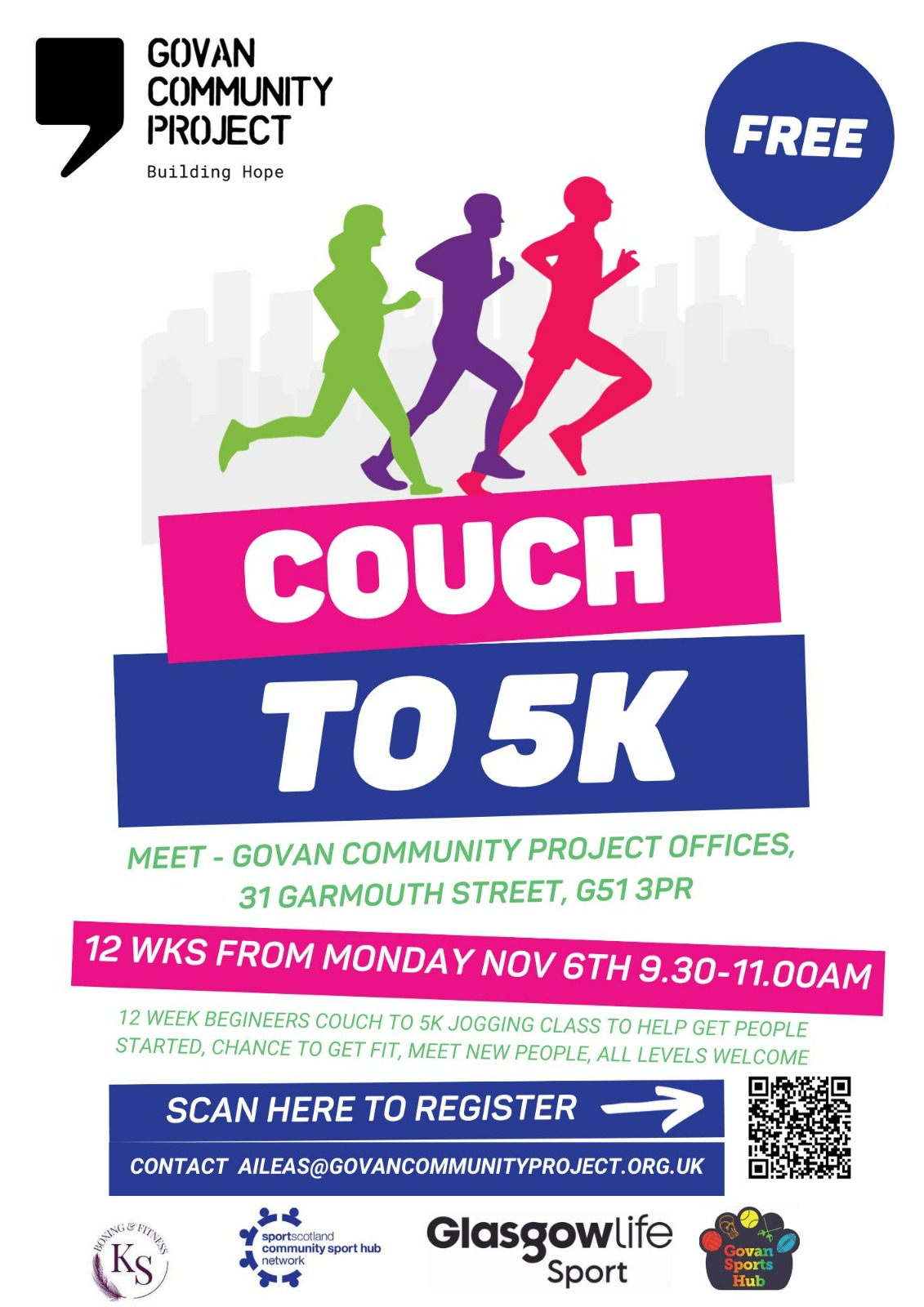
Govan Community Project is creating a brand new team of community fundraising volunteers. Would you like to help make a difference to the lives of refugees and people seeking asylum in Glasgow?
From holding events, taking on challenges or organising bake sales, volunteers will be at the heart of the community, helping to raise much needed funds to the support the work we do.
We are holding an information evening to discuss the roles, and provide more information about the training and support available for volunteers.
If you have some time to spare and want to make a difference, get involved!
The community fundraising information session will take place on Wednesday 11 October from 6pm-7pm at the GCP office in Govan.
If you have any further questions please email megan@govancommunityproject.org.uk.
